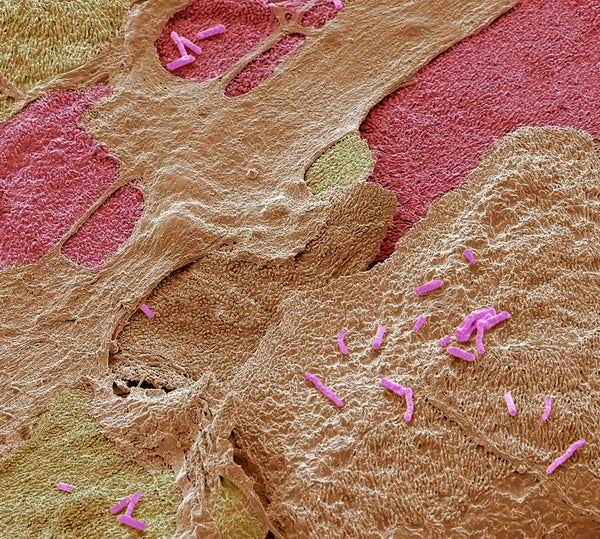Chronic UTI Pain Could Be Caused by Overgrown Nerves - Scientific American
March 4, 2024
3 min read
Urinary tract infection symptoms can resurface long after bacteria are gone. A new study suggests nerve growth is to blame

A colored scanning electron micrograph (SEM) of Escherichia coli bacteria on bladder epithelial cells found in a urine sample from a person with a urinary tract infection (UTI).
Steve Gschmeissner/Science Source
Urinary tract infections (UTIs) are among the world's most common bacterial maladies. Approximately 12 percent of men and roughly half of all women experience a UTI in their lifetime. Up to 44 percent of women who get a UTI develop a second infection within six months. And for some, painful UTI symptoms recur and become chronic—even after the infection has cleared and the harmful bacteria are no longer present in the urinary tract.
Scientists have long puzzled over why UTI pain lingers in some people, but new research has just identified a likely cause: a study published Friday in Science Immunology describes how recurrent UTIs can lead to an overgrowth of pelvic nerve cells, which prolong the pain of an infection. The finding could have implications for future treatments and could help doctors avoid overprescribing antibiotics for seemingly stubborn UTIs.
"This is a really remarkable paper," says Glenn Werneburg, a urologist at the Cleveland Clinic, who was not involved in the study.
On supporting science journalism
If you're enjoying this article, consider supporting our award-winning journalism by subscribing. By purchasing a subscription you are helping to ensure the future of impactful stories about the discoveries and ideas shaping our world today.
Soman Abraham, a Duke University pathologist and coauthor of the new study, says the new research began with a simple question: "Why do we see these UTI symptoms without necessarily seeing any bacteria in the urine of the patient?" To find out, he and his team examined bladder tissue biopsies from 25 people with lingering UTI pain but no trace of associated bacteria in their urine and from 12 others without such pain. The researchers found that those reporting frequent UTI symptoms had significantly more nerves packed into their pelvic tissue compared with the control group. "That was striking," Abraham says.
The next piece of the puzzle was determining whether these extra nerves were the result of repeated infection—or its cause. The researchers infected rodents' bladders with Escherichia coli bacteria and treated them with antibiotics, allowed them to recover and then repeated the process. Thiscaused the mice to display continuing UTI symptoms, such as frequent urination and signs of pelvic sensitivity. And mice that had undergone three UTI infection-and-treatment cycles had similar nerve overgrowth to that observed in the human biopsies. In contrast, mice that only experienced one infection did not have an overabundance of nerves.
The researchers think repeated bacterial infections may activate specialized immune cells known as mast cells, which release a compound called nerve growth factor. This chemical signal sends nerve growth into overdrive. Once these new nerves are in place, the bladder and pelvis become extremely sensitive, which the researchers say probably causes long-lasting pain and other UTI symptoms after the actual infection is gone.
Unfortunately, because of stigma and lack of research, it can be difficult for clinicians to adequately care for patients with this lingering pelvic pain. "When a patient goes to a healthcare provider [for a recurrent UTI], they're often dismissed," says Melissa Kramer, founder of the clinical network Live UTI Free, who was not involved in the study.
The only current treatment option for a UTI is antibiotics. So when a person with a UTI has no trace of urinary tract bacteria, some clinicians tend to either downplay their reported pain or prescribe antibiotics in case urine tests might have missed remaining bacteria. But such a default measure may do more harm than good over time. Overusing antibiotics selects for bacteria that are resistant to the drugs, adding to the growing global problem of "superbugs" that are impervious to available treatments. Current approaches to chronic UTI symptoms often fail to address discomfort, but Abraham says this vicious cycle of pain may not be necessary.
The researchers plan further experiments to investigate whether they can stop pelvic nerve overgrowth before it takes off. Certain drugs or neutralizing antibodies may be able to block mast cells in the bladder from releasing nerve growth factor. The scientists also want to learn whether the newly overgrown nerves are permanent or whether they can be pruned back over time like wild brambles. If these solutions work, they could lead to new treatments—or even cures—that can address recurrent UTI pain when antibiotics aren't needed and won't help. "So it's important for these patients, but it's also important to the population and societal level," Werneburg says.
"I love work like this because it's looking at a different aspect of what could be causing the issue," Kramer says. She adds that it helps to recenter the research and care on people's own experiences. "It puts pain at the center."
Comments
Post a Comment